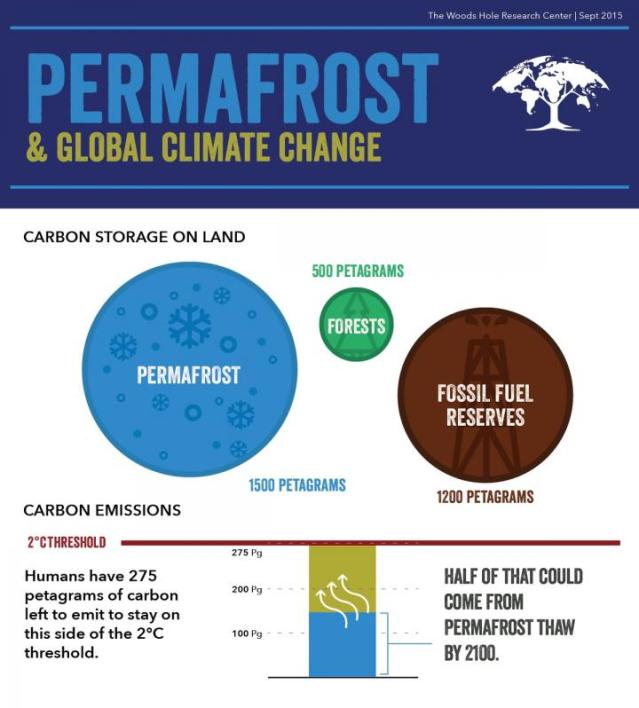Oct 14 2015
Three leading Woods Hole Research Center (WHRC) experts on the threats of climate change in the Arctic will urge France's President Hollande and other political leaders to address the threat posed by thawing permafrost in the Arctic at the Arctic Circle Assembly in Reykjavik, Iceland on October 15.
WHRC scientists Scott Goetz, Max Holmes and Susan Natali, who advised the State Department and helped to inform President Obama's strong remarks at the GLACIER conference in Alaska last month, will present research on permafrost thaw and other serious threats caused by climate change.
 Permafrost thaw and global climate change. Credit: Woods Hole Research Center
Permafrost thaw and global climate change. Credit: Woods Hole Research Center
"Given that permafrost contains almost twice as much carbon as the atmosphere, permafrost thaw and the subsequent loss of carbon from permafrost has the potential to throw a wrench in current policy solutions to contain global warming," said Dr. Max Holmes, a Senior Scientist at WHRC.
The carbon released by permafrost thaw causes more warming, which in turn causes more permafrost thaw. "This potentially self-reinforcing cycle could constitute a 'tipping point' that would be difficult to stop once underway. But the magnitude of this feedback can be controlled--the less fossil fuels we emit, the less carbon that is released from permafrost," said Dr. Susan Natali, an Assistant Scientist at WHRC and presenter at the Arctic Circle conference.
Despite the well-documented urgency of this problem, it has received little attention from policy makers. Unlike deforestation and fossil fuel combustion, which are under direct human control, permafrost thaw cannot be immediately turned off once begun. According to WHRC Senior Scientist Scott Goetz, "President Obama said recently in Alaska that we cannot deny the science of climate change. While there is still much to be learned about the magnitude and timing of this threat, the message we are taking to Iceland is we must act now to reduce carbon emissions from fossil fuel combustion, lest it be too little too late to avoid a runaway train of thawing permafrost."
Arctic 21 is a network of organizations calling attention to the impacts of climate change in the Arctic and the rest of the world. For Rafe Pomerance, Chairman of Arctic 21and former Deputy Assistant Secretary of State for Environment and Development, "The Arctic is unraveling. Our hope for the Arctic Circle Conference is to raise global awareness about the realities and threats of climate change in the Arctic so that world leaders will act on the science at COP 21 in Paris."
WHRC scientists have been a part of a series of high-level US government conversations about climate change in the Arctic beginning this past spring, leading to the technical meeting of international climate change negotiators in Bonn, Germany in June. This Arctic conference follows closely on the heels of the GLACIER Conference in Alaska in August where President Obama spoke passionately about the impacts of climate change already occurring in the Alaskan Arctic. At COP 21 in Paris this December expectations run high that the international policy community will execute real commitments to combat climate change in Paris. President Hollande's presence in Iceland encourages optimism.
The key science points, implications and recommendations can be found in the WHRC Policy Brief, "Permafrost and Global Climate Change."